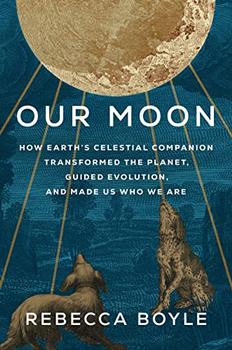Summary | Excerpt | Reviews | Beyond the Book | Readalikes | Genres & Themes | Author Bio

How Earth's Celestial Companion Transformed the Planet, Guided Evolution, and Made Us Who We Are
by Rebecca Boyle
For most of human history, people believed that the Moon had oceans, too. Astronomers through the centuries believed the Moon's dark spots were actually lunar seas. Moon-fixated scientists in the seventeenth and eighteenth centuries believed this so fully that the list of features on its face are all named as oceans, lakes, and bays. The Sea of Tranquility, where Apollo 11 landed, was a real sea in the mind of Moon mapper Giovanni Battista Riccioli, the Jesuit priest who gave us the Moon's modern nomenclature in 1651. Collectively, the dark spots are called maria, from the Latin for "seas." In reality, as the Apollo Moon rocks taught us, the seas are vast plains of cooled lava.
While you would experience the Moon as a chalky, dry sea of emptiness, it does have water. Depending on what scientific instruments you believe, it has a whole lot. The trouble is that the water is locked up in the regolith as hydrated minerals, or may exist as ice that has been buried forever in craters that never see the light of day. Liquid water cannot exist on the Moon. With no atmosphere to keep water liquid, it would evaporate instantly, and its hydrogen would fly off into space. Any future Moon visitors hoping to access lunar water will have to be really talented chemists, skilled at liberating water from stone.
Excerpted from Our Moon by Rebecca Boyle. Copyright © 2024 by Rebecca Boyle. Excerpted by permission of Random House. All rights reserved. No part of this excerpt may be reproduced or reprinted without permission in writing from the publisher.
Your guide toexceptional books
BookBrowse seeks out and recommends the best in contemporary fiction and nonfiction—books that not only engage and entertain but also deepen our understanding of ourselves and the world around us.